from
the Coronation issue of the Soham Grammarian, Summer
1953L. G. J. 1922-1953by TLR [Mr Riley] It is with dismay that we view the imminent departure from among us of Mr. L. G. Johnson, who first came here from Dronfield Grammar School in 1922, 31years ago, "consule Clemente", and has been so intimately connected with the development of the school from the days when its very survival was in doubt, when standards were low and scholarships crude. For the steady improvement which resulted he can claim a large share of the credit. For over thirty years he has been the benign presiding genius of the place, stepping in when Headmasters were not: quoting precedent and suggesting solutions, quietly taking charge and running things at moments of crisis. This was particularly so at the beginning of the war when we were caught without a Headmaster and there was chaos because the first bomb had capsized all the inkwells (of Whitehall - not Soham) and nullified all the plans. |
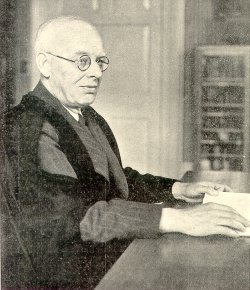 |
There were air-raid shelters to build, school dinners to be organised for the first time, staff called up had to be replaced - the list could be a mile long, but all was done quietly and with a minimum of ostentation, and in the intervals between his normal teaching times. He revived the School Magazine which had died of insolvency - solvency was important in 1922. He, with A. J. Covell, re-invigorated the Old Boys' Club, which has flourished ever since, except when war cramped its style and decreased its membership roll.
He was for many years English Examiner for the County in the Minor Scholarships examinations. As a writer of merciful testimonials he was peerless. We should probably have made him write this one, his own, but that modesty would prevent his doing real Justice to the task. For years he was responsible for the Speech Day plays too.
In the days of small beginnings he took his share in all the school's activities. He was never missing and never late - cycling to and from Ely every day, rain or shine. He is said to be the only man who ever read the Times Educational Supplement from cover to cover while riding a bicycle six miles. He played a great game of football in those days and cycled home for his bath after it. He taught three or four subjects, including Mathematics. What Old Boy of the twenties will forget his little band of outcasts from the French class who covered themselves and him with glory by licking the pants off the chosen one July?
But Latin and English were his real metier and well he taught them in an area where, if the one is a dead language the other was as yet unborn until he got to work. His has been an unremitting assault on ignorance in the generally accepted sense; but the instilling of factual knowledge has been to him only incidental to the hard and unrelenting battle against that narrowness of the mind, that purely materialist outlook, which weighs all effort against immediate gain, which views learning as something to be converted into solid profit - and quickly, and which discounts, all unaware, the less tangible gain of even the smallest glimmer of insight into beauty mirrored in art and literature, and of the faintest dawning of an understanding of life and character: these things which are the end and aim of every real teacher.
So he regarded his job and he had all the tools for it; the classical humanist basis of his earlier studies expanded into a vast general knowledge which has enabled him repeatedly to surprise us other specialists by his insight into our domains. His real hatred of window-dressing and his impatience with humbug of any kind are balanced by a deep sympathy with human motives and that understanding of the juvenile male which has always conditioned his approach to his classes.
He has always had a soft spot for the "artful dodger" and an infinite patience, concealed if need be by the outpouring of entirely spurious wrath upon the head of the scrimshanker. There would probably be marzipans later to heal the smart especially if W.B. [West Brom] were near the top of the League.
His fat chuckle could always be evoked by youthful impudence and well they have known it. He was respected but never feared : the combination is rare. What better thing could be said of a teacher than that all have gained and none been the worse for sitting under him ? We, who have known him as teacher or as colleague, can all say that his philosophy has had its effect on all of us and to that extent he will always be here so long as anyone remains that knew him.
He is known in wider fields: as a member of the English Association and the Classical Association, of the Executive Council of the Poetry Society and of its Editorial Board. In vacations he roamed Europe widely (if cheaply as teachers must).
With all this has gone a real modesty; he has never been nearly satisfied with all that he has here achieved. Perhaps that divine discontent has been compensated in that other side of his life about which he has always been so reticent, symbolised by those slim volumes which have given delight to many and earned him that succes d'estime among the really discerning on both sides of the Atlantic, which has culminated in the final honour of his appointment to the Editorial Board of the Poetry Review. For, of course, he is not really retiring. He is simply leaving school and going to work with a mind still as youthful as that of any alumnus leaving Soham Grammar School. He is going to live near Hardy's Egdon Heath, alongside an old Roman road.
He carries with him our deep affection and sincerest good wishes for a happy life in this new sphere. May he and Mrs. Johnson live long to enjoy health and happiness so richly earned.
THE SCHOOL SONG
Although it has always been extremely difficult to persuade Mr. Johnson to talk about his poetry, from time to time trusted friends have gleaned occasional items regarding a new volume of poems, a reading on a B.B.C. Programme and, of late, poems of his being set to music. Now that poetry is to become his life instead of teaching he has allowed us to speak rather more freely of his "other love" and both graciously and willingly acceded to the Headmaster's request that he should write for the school a school song. With typical generosity he wrote three and appended to each his own frank criticisms. The chosen one was then suitably polished by the author and given to the School in the form set out below. It is hoped later to have it set to music.
ALMA MATER
Land of great skies and measureless horizons,
Image of Heaven's calm eyes all deeds enfolding,
Let us acquire thy clear and ample vision,
Make us worthy of thy beholding.
School at the bright land's centre, radiant always,
Close at hand or far in recollection,
Gracious of gifts as when we first beheld thee,
Make us deserve thy deed affection.
Lord, who beholdest all, the great departed,
These and their sons in eager hope now leaping
To surpass them as the future glows and widens,
Have them in Thine especial keeping.
To hear the tune and see the rejected versions, please select History in the Site Menu and then select School Song
OLD BOYS' NEWS - NINETY-THREE TERMS AT SOHAM
from the Coronation issue of the Soham Grammarian, Summer 1953
Few members of the present-day Old Boys' Club were at School when, as a young man, Mr. Johnson came to us thirty-one years ago. The School of those days was housed in very cramped buildings and consisted of about ninety boys undergoing secondary education, and a very small Preparatory Department. Scholastic achievements of these pupils were limited; probably less than half those boys who entered the School ever advanced to Cambridge Senior or School Certificate level.
The odd exceptionally brilliant boy might, perhaps, aspire to Higher School Certificate standard. At prayers each morning we gazed in awe upon the Honours Board and the very few illustrious names recorded there, headed by that of R. C. O. Leonard who had passed the Intermediate B.A. of London University. These were indeed brilliant people, for the small teaching staff of those days was overburdened with the task of trying, mostly unsuccessfully, to get what pupils it could up to such an educational standard as fitted them to undertake the final year's study for the Senior.
The "chronics" became bogged in Form IV or Lower V, from which forms they eventually left School. The gifted boy who aspired to Higher School Certificate standard, did so by dint of hard work and private study, generally with such guidance as the Headmaster could afford from his already overburdened time. Most of the masters, in fact, were not really qualified to instruct to a level above "Senior" standard. Indeed, there were more failures in English than French.
Into such an atmosphere came Mr. Johnson to teach English, Latin and Advanced History to such as were able to comprehend. I remember well his first day. He was a young man of less than average build with light, sparse hair. Rumour had it that he was a good Soccer player: after all, did he not hail from 'Brum' and were not the "Villa", the "Wolves" and "West Brom" his teams? We were quickly informed about the home of good Soccer and his performances on the field nearly, but not quite, changed our youthful allegiance from the Spurs, or was it Chelsea? Rugger had not yet been thought of at Soham.
The new man, like another Johnson in the School of those days, was soon christened "Jugger". Quietly and effectively he began to make his mark. School Certificate failures in English began to drop, especially when the juniors he took in hand painfully worked their way up the school to Upper V.
A little Latin had been taught, out of school hours, to a few enthusiasts who volunteered for extra study. Under Mr. Johnson, the subject was introduced into the curriculum as an alternative to Woodwork and those of us who "opped" for Latin did so less out of liking for the subject than for an escape from wood-spoiling. The Latin classes were very small and the lessons rather free and easy. Perhaps that is why we took more kindly to it than French, which we detested for a very good reason. But soon Mr. Johnson made the "dead" language live and this fact explains the secret of his great success at Soham. He was a born teacher, systematic, methodical and thorough, inspiring in us the spirit of learning. His classes were not regimented and he was far from being a strict disciplinarian, yet they never got out of hand for he had his own methods of retribution. Shafts of wit, flavoured with a mild sarcasm, flashed over the scene and lighted on his victim with greater effect than a savage sentence. We began to learn and to remember, probably much against our will. Therein lies the success of every great teacher. He showed that the intractables could be taught, after their interest and confidence had been won.
No one will know how great were the personal sacrifices he made for his pupils. There was no formal Sixth Form teaching in those days, but gradually he inspired boys to sit for Higher Certificate in his subjects. He realised that boys from rural areas were not necessarily of lower ability than those from the town and that, although few of them had much cultural background or opportunities, they could be led to aspire to better things by contact with both classical and modern language. What he might have achieved in a different environment is a matter for conjecture; what he has achieved at Soham will never be fully appreciated, but the lives of countless Old Grammarians bear indisputable testimony to his influence in their early formative years.
His work was not circumscribed by formal teaching. He completely reorganised and revitalised the School Magazine, he built up and developed the Library, he played and taught Soccer with the same enthusiasm as he taught in School. In countless ways he helped to transform School life from the comatose condition in which he found it to the dynamic state it is in today. What is less well known is that somehow or other he found time, outside his School activities, to make his mark upon the literary world. We shall never know what this cost in midnight oil, but the breadth and depth of his knowledge of all that is best in English literature, both ancient and modern, could not have been acquired without voracious reading and deep and critical thinking.
To the many Old Boys who have passed through his hands Mr. Johnson and the School are synonymous, and it is doubtful if he ever forgot an old pupil. Their success and advancement brought him satisfaction and nothing gave him greater pleasure than to hear that his boys had achieved some fresh honour, whether academic, sporting, commercial, or in the world generally.
Unfortunately the time has come for his quiet severance from the day-to-day life of the School. We can but wish him, and his devoted wife, many happy years of retirement, believing that he will at last have sufficient time to develop to the full his undoubted literary talents. His influence will long be felt in the School to which he has devoted his life and in the hearts of us all there will abide for ever the memory of an outstanding teacher and of a man who never spared himself in the interests of his pupils.
[Mr. Johnson was presented with a typewriter by the Old Boys]
AN APPRECIATION OF "JUGGER" BY A VERY ORDINARY "OLD BOY"
from the Coronation issue of the Soham Grammarian, Summer 1953
On hearing the news of Mr. Johnson's impending retirement and relating this to a fairly new "old boy" I was not surprised that our thoughts should have been the same, namely: the School won't be the same without him.
In the Bible we read of one who on being sent to help others "sat where they sat" and in a true sense 'J' did just that. He always found a common point of contact, sometimes by means of family history, a brother who had been before, or a present soccer fan. He somehow saw the possibilities in each individual and persevered to make dreams into realities. His methods included the qualities afforded by wit, humour, sarcasm, poetic licence and the more tangible, namely pencils, rubbers and stamps.
What then to-day can I thank L.G.J. for? Not the ability to read Latin quotations, for I was not numbered among the 'elect' and did not receive that extra 'bus tuition.' I did, however, capture in part from the Master the enthusiasm and zeal to appreciate good literature and books. What a blessing and boon this can be! Some time ago I stood in King's College Chapel and gazing around I suddenly heard Mr. Johnson's voice, saying:
These lofty pillars,
spread that branching roof
Self-poised, and scoop'd into ten thousand cells
Where light and shade repose, where music dwells
Lingering, and wandering on as loth to die -"
On another occasion during an interval on television words were being read which might have been pointless and meaningless had I not heard them from another's lips some years ago. On these occasions I can but say "Good old Jugger!" What might still have been one of those Shakespeare's things' now became living and real because I had travelled the road through them with a trained guide.
An appreciation of dramatic art and the urge to act was born under Mr. Johnson and through his efforts a bad term report bore the Headmaster's saving remark, 'He was a distinct success in the school play on Speech Day.' That remark was also in a way a tribute to Mrs. Johnson, for one afternoon we paid an unforgettable visit to the Johnson home, ostensibly for a practice of the School Play, but I often wonder if, when Mrs. Johnson hears of ravenous wolves, she calls to mind that afternoon when certain schoolboys sat around her table and emulated locusts.
It is then with real affection and heartfelt good wishes that I on behalf of many other very ordinary "old boys" bid farewell to Mr. Chips, and pray that he and Mrs. Johnson may have many years of happiness and contentment before them, knowing that old boys all over the world wish them well.
Soham Grammarian Summer 1960
"BISH"
One of the most delightful afternoons it was my pleasure to have during the Easter holidays was spent in the company of Mr. and Mrs. L. G. Johnson, now in retirement near Poole in Dorset. We descended on them quite out of the blue, and as a whole family, but of the warmth of our welcome there was no doubt. Very soon I was seeing what ideal retirement was like - the mind as alert as ever, a memory for things past that were worth while and a generosity of spirit that was touching. Everything and everybody about which and about whom L.G.J. spoke was referred to in generous terms. He remembered the best and only the best about his former colleagues, pupils and the School. And he was still writing his inimitable testimonials.
The pleasure that he had got that morning out of hearing that he had helped a former pupil to a headmastership was as great as if he himself had been singled out for distinction. The pattern of L.G.J.'s life is that he works in the morning at his literary work, gardens in the afternoon and then enjoys the evening listening to music and to plays on the wireless set which was his parting gift from grateful old boys.
I was moved to speak more fully of my visit to L.G.J. at the first staff meeting after my return to School so impressed was I that our former colleague has discovered the secret which many, probably all, men search for but few find-the secret of a happy retirement. I am not certain that I know what it is or that L.G.J. knows, for he would be the first to want to pass it on to others if he knew what it was, but I know that it is connected with a generosity of mind that looks only for the best that is in others and through this obtains the contentment that Browning catches in his famous line:
"Grow old along with me; the best is yet to be".
E.A.
IN MEMORIAM
Based on the Summer 1966 Soham
Grammarian
The sudden death in April of Mr LG Jugger
or Bish Johnson, a former English master and second
master of the School, came as a great shock to the many
generations of Soham Grammarians who knew him as an inspiring
teacher and a sensitive poet.
Mr Johnson's service to the school lasted 29 [sic] years, the last fifteen as second master. Although no boys at school now can remember him, many are the sons of his former pupils. He was a true schoolmaster in that he loved teaching and loved boys. He had the true schoolmaster's gift of inspiring affection in his pupils and discipline came automatically without ever having to be thought about first.
His framed photograph has alway hung on the wall of the school library, an appropriate place for one who through his teaching introduced many generations of Soham Grammarians to English Literature and whose own ability in this creative art was very high. He was a poet in his own right and when he retired in 1953, he became Editor of The Poetry Review. One of his last poems appeared in The Field. He wrote the words of the Soham Grammar School Song Alma Mater - Land of Great Skies and Measureless Horizons.
He enjoyed 13 years of very happy retirement in Dorset and died quite suddenly while standing at the bus stop with his wife. A letter of condolence has been sent to Mrs Johnson on behalf of the Club.
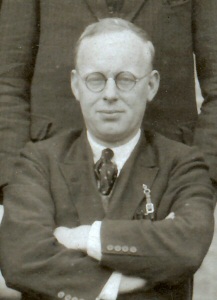 from a late 1920s School photo |
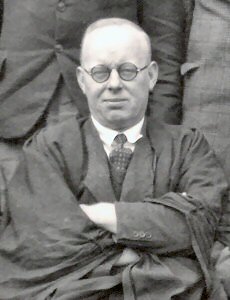 from the 1935 School photo |
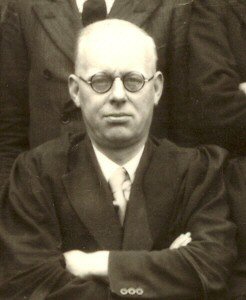 from the 1937 School photo |
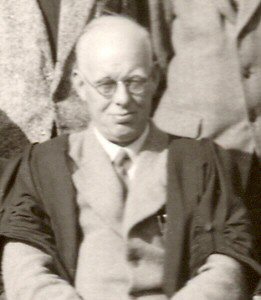 from the 1946 School photo |
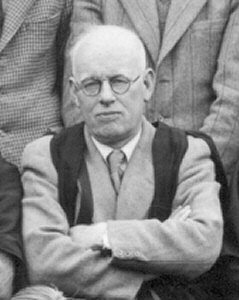 from the 1949 School photo |
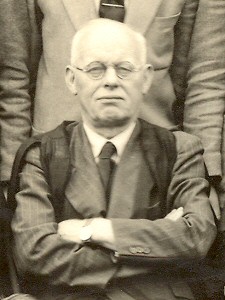 from the 1952 School photo |
see also Alan Diver's wartime reminiscences
Roger Sykes
(1942 entry) - 17 Nov 02: I think my contemporaries of
1942/47 would know him more as "Bish" Johnson than
"Jugger"! [added - Editor]
He obviously travelled back and forth from Ely to Soham on
the school bus, which departed from Market Street soon after
8am and returned to Ely High School (conveniently depositing
me right outside my sweet shop home next door to the High
School) at about 4pm. One day, as the bus went around
the gentle bend and over the small bridge (as I
remember it, by Summerscales Cycle Shop), I was standing
ready to disembark when I toppled backwards and fell against
the bus window. To my horror the glass window
cracked! I was escorted to Mr Armitage's study by
"Bish" where I was closely questioned about the
whole unfortunate episode. Strangely I cannot recall the
final outcome, so I daresay it was regarded as a pure
accident.
Terry Allen 39 (8 Mar 2005): Bish had a habit of tying a knot in his gown, trapping pieces of chalk therein. This provided a savage weapon for beating the heads of pupils.
Do you have any appreciations or
anecdotes relating to Mr Johnson? Other
photographs of Mr Johnson would be appreciated for this page
please contact
the editor
This page was last updated on 16 Mar 2010